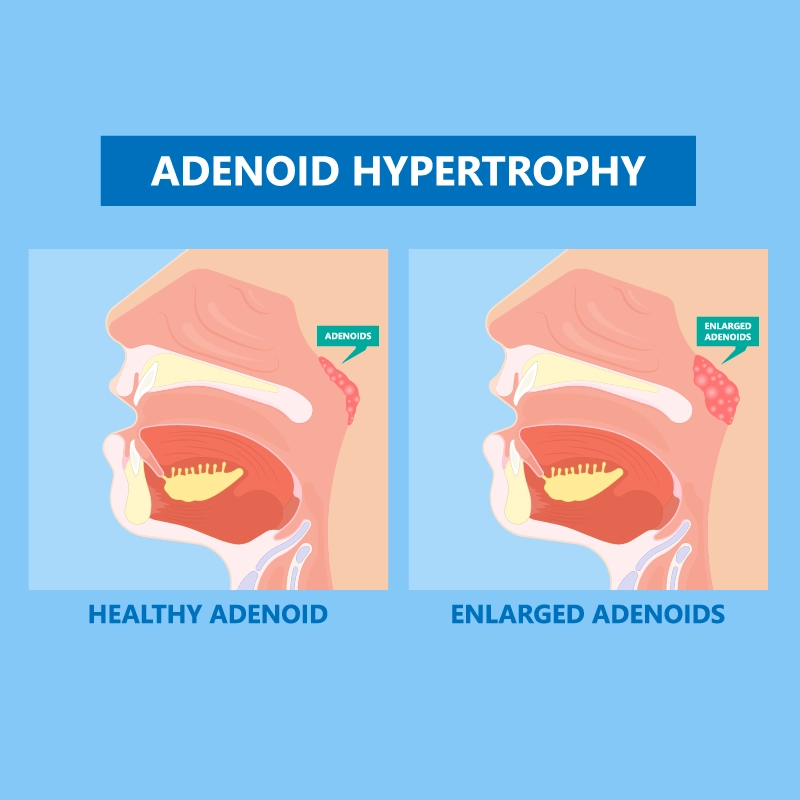
Adenoids are small structures located at the back of the nose and above the throat, which help to protect the body against infections. Adenoid hypertrophy is a condition where the adenoids become enlarged due to inflammation or infection, causing a variety of symptoms and discomfort.
Here, we will discuss the causes, symptoms, and treatment options for adenoid hypertrophy.
Causes of Adenoid Hypertrophy:
Adenoid hypertrophy can be caused by various factors, including:
Infection: Adenoids are part of the immune system, and they can become infected by bacteria or viruses. Repeated infections can cause the adenoids to become swollen and inflamed.
Allergies: Allergies can also cause adenoid hypertrophy, as the body's immune system reacts to allergens by producing excess mucus, which can lead to inflammation and swelling of the adenoids.
Genetics: Adenoid hypertrophy may also have a genetic component, with some people having a predisposition to developing enlarged adenoids.
Age: Adenoid hypertrophy is more common in children, as they are more prone to respiratory infections.
Symptoms of Adenoid Hypertrophy:
Adenoid hypertrophy signs and symptoms can vary depending on the severity of the condition. Some common symptoms include:
Difficulty breathing through the nose: Enlarged adenoids can obstruct the nasal passage, making it difficult to breathe through the nose.
Snoring: Adenoid hypertrophy can cause snoring due to the obstruction of the airway.
Sleep apnea: Severe adenoid hypertrophy can cause sleep apnea, a condition where breathing stops for brief periods during sleep.
Mouth breathing: Enlarged adenoids can make it difficult to breathe through the nose, leading to mouth breathing.
Chronic ear infections & decreased hearing: Enlarged adenoids can also affect the Eustachian tube, leading to chronic ear infections and collection of fluid in the ear.
Speech problems: In severe cases, adenoid hypertrophy can cause speech problems due to the obstruction of the nasal cavity.
Change in teeth alignment and facial structure: Decreased airflow through the nose and mouth-breathing can cause crowding of teeth and affect the development of the face.
Treatment of Adenoid Hypertrophy:
Adenoid hypertrophy treatment depends on the severity of the condition and the symptoms experienced by the patient. Some common treatment options include:
Watchful waiting: In mild cases, doctors may recommend watchful waiting, as the adenoids may shrink on their own over time.
Medications: Medications such as nasal decongestants, antihistamines, and steroid nasal sprays may be prescribed to help reduce inflammation.
Surgery: In severe cases of adenoid hypertrophy, surgery may be necessary to remove the adenoids. Adenoidectomy is a relatively simple procedure that can be performed under general anesthesia.
Home care: In addition to medical treatment, there are several home care methods that can help decrease symptoms of adenoid hypertrophy. These include using a humidifier to keep the air moist and avoiding allergens.
Conclusion:
Adenoid hypertrophy is a common condition that can cause a variety of symptoms and discomfort. If you or your child is experiencing any of the symptoms of adenoid hypertrophy, it is important to consult a doctor for an accurate diagnosis and appropriate treatment. While watchful waiting and medications may be sufficient in mild cases, surgery may be necessary in severe cases. By understanding the causes, symptoms, and treatment options for adenoid hypertrophy, you can take steps to manage the condition and improve your quality of life.

